|
|
|
Sort Order |
|
|
|
Items / Page
|
|
|
|
|
|
|
| Srl | Item |
| 1 |
ID:
125091
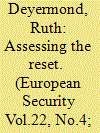

|
|
|
|
|
| Publication |
2013.
|
| Summary/Abstract |
Critics of the Obama administration's 'reset' with Russia claim that it has failed to improve bilateral relations and has conceded too much to Russia at the expense of American interests. In fact, the reset has delivered significant improvements in key areas and established the institutional basis for continued cooperation in the future, benefiting both states. Although disagreements remain on several important issues including missile defence, humanitarian intervention, and democracy, the reset has been broadly successful on its own terms, which were always limited in scope and based on a pragmatic recognition of the limits of possible cooperation. Future progress is uncertain, however - obstacles include differences of national interest; the complicating effects of relations with third party states and the impact of domestic politics. A continuation of the pragmatic approach underpinning the reset represents the best chance for stability in the US-Russia relationship.
|
|
|
|
|
|
|
|
|
|
|
|
|
|
|
|
| 2 |
ID:
104323
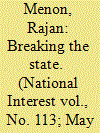

|
|
|
|
|
| Publication |
2011.
|
| Summary/Abstract |
THE MIDDLE East roils and one fact is certain: interventions end badly. For intervention leads to postwar reconstruction and postwar reconstruction leads to failure.
|
|
|
|
|
|
|
|
|
|
|
|
|
|
|
|
| 3 |
ID:
134064
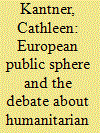

|
|
|
|
|
| Publication |
2014.
|
| Summary/Abstract |
Studies on the democratic control and legitimacy of Common Security and Defence Policy (CSDP) have thus far mostly focused on formal institutions. However, a comprehensive analysis requires including the 'sociocultural infrastructure' in which such formal institutions are embedded. Students of democracy have argued that the public sphere is a crucial dimension, if not a precondition for all mechanisms of democratic control in general. This paper investigates whether and in which ways Europeans participated in transnational European communication on humanitarian military interventions (1990-2005/2006). The paper analyzes a full sample of 108,677 newspaper articles published in leading newspapers of six EU member states, and the US as a comparative case. It demonstrates that the 'national' arenas of political communication are intertwined and allow ordinary citizens to make up their minds about common European issues in the highly controversial and normatively sensitive realm of humanitarian military interventions.
|
|
|
|
|
|
|
|
|
|
|
|
|
|
|
|
| 4 |
ID:
141788
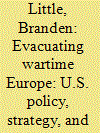

|
|
|
|
|
| Summary/Abstract |
The U.S. government facilitated the repatriation of more than 125,000 Americans stranded in Europe upon the outbreak of the First World War in 1914 by declaring neutrality and dispatching the U.S. Relief Commission, which comprised U.S. warships carrying gold to assist desperate citizens. Participating U.S. officers conducted unauthorized tours of battlefields and arms plants to glean intelligence that would aid American mobilization plans. The relief commissioners and many of the Americans they aided, moreover, championed additional humanitarian interventions in war-torn regions and catalyzed the defense preparedness movement in the United States.
|
|
|
|
|
|
|
|
|
|
|
|
|
|
|
|
| 5 |
ID:
080685
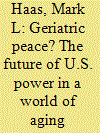

|
|
|
|
|
| Publication |
2007.
|
| Summary/Abstract |
In the coming decades, the most powerful states in the international system will face a challenge unlike any experienced in the history of great power politics: significant aging of their populations. Global aging will be a potent force for the continuation of U.S. economic and military dominance. Aging populations are likely to produce a slowdown in states' economic growth at the same time that governments will face substantial pressure to pay for massive new expenditures for elderly care. This economic dilemma will create such an austere fiscal environment that the other great powers will lack the resources necessary to overtake the United States' huge power lead. Moreover, although the U.S. population is growing older, it is doing so to a lesser extent and less quickly than all of the other major actors in the system. Consequently, the economic and fiscal costs created by social aging-as well as their derivative effects on military spending-will be significantly lower for the United States than for potential competitors. Nevertheless, the United States will experience substantial new costs created by its own aging population. As a result, it will most likely be unable to maintain the scope of its current international position and will be less able to realize key international objectives, including preventing the proliferation of weapons of mass destruction, funding nation building, and engaging in military humanitarian interventions
|
|
|
|
|
|
|
|
|
|
|
|
|
|
|
|
| 6 |
ID:
189541


|
|
|
|
|
| Summary/Abstract |
The Journal of Palestine Studies’ special issue on infrastructure, environment, and health in Palestine sheds new light on the conditions and possibilities of politics. Although it is commonly viewed as “an entity ostensibly separate from technology and other human constructions,” the environment is in fact a particular configuration of “socio-technical arrangements.” The special issue’s four articles and two reflection essays—by Nadi Abusaada, Leena Dallasheh, Samir Harb, Cristina Violante, Nimrod Ben Zeev, and Emily McKee—span historical periods from Ottoman-ruled Palestine to the contemporary era. Hailing from the fields of history, architecture, anthropology, and legal theory, the contributors draw on original archival, spatial, and ethnographic research to parse the realities, experiences, and lessons that Palestine offers beyond its status as a site of settler-colonial deprivation and toxicity. Together they demonstrate that infrastructure, environment, and health are fundamentally and irrefutably political.
|
|
|
|
|
|
|
|
|
|
|
|
|
|
|
|
| 7 |
ID:
133525
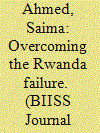

|
|
|
|
|
| Publication |
2014.
|
| Summary/Abstract |
This paper discusses two norms that the United Nations led humanitarian interventions have been practicing since the 1990s: the Responsibility to Protect (R2P) and the Protection of Civilians. Both are very important agenda setters for future humanitarian interventions. The objective of this paper is to provide critical insights about how these two norms are applied on a limited scale during humanitarian interventions. The paper begins by reflecting on the failures of the United Nations in stopping and providing timely response during the genocide in Rwanda in 1993. It is argued that the causes of the Rwanda failure are the United Nations (UN), the United States (US), and the international community's inaction and unwillingness to spend resources to stop or prevent violent conflicts and/or gross violations of human rights in an impoverished region like Africa. These regions are of little value and pose little threat to the United States and other great powers. A human catastrophe in Rwanda or any other economically poor countries of the world seems distant to them, and would require long term engagement that the great powers think as would be a burden on them. They judge international prohibitions and take pivotal decisions of humanitarian interventions on a case by case basis when they think it is appropriate and necessary. Most often the great powers and/or the permanent members of the Security Council reflect their domestic decision makers' positions instead of the interests of justice, and often only uphold their national interests and other criteria. The paper then discusses the central challenges to operationalise the doctrine of Protection of Civilians - the very reason the concept of R2P was coined. Here the paper argues that the principle of R2P suffers from several important limitations when it aims at implementing the doctrine of Protection of Civilians. In the final section, the 2001 report on R2P of the International Commission on Intervention and State Sovereignty (ICISS), which was independently launched by the Canadian government, and the Outcome Document of the 2005 World Summit is analysed. It is suggested in the paper that many important recommendations of the ICISS were sidelined in the Outcome Document and this imposed limitations on the effectiveness of R2P's implementation. It is also argued that the primary causes of Rwanda failure were not reflected in these initiatives.
|
|
|
|
|
|
|
|
|
|
|
|
|
|
|
|
| 8 |
ID:
123891
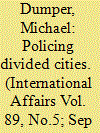

|
|
|
|
|
| Publication |
2013.
|
| Summary/Abstract |
The study of conflict in cities has emerged as a significant subfield in a number of disciplines. For policy-makers and analysts concerned with humanitarian interventions in cities emerging from conflict, the city as a form of human organization and its impact upon the establishment of security is of particular importance.
Less academic attention has been given to divided cities where the legitimacy of the state authority controlling the city is, itself, in question and where stabilization and the establishment of security is protracted. The adoption of integrative and inclusive approaches to policing becomes a key component in security regimes in divided cities. In these cases, however, to what extent should the stabilization phase be recast? Is the law enforcement phase subsumed and over-ridden by national security concerns?
This article examines these questions by suggesting a number of security models which have been used in a range of divided cities. It focuses in more detail on a study of Israeli policing in the Palestinian areas of East Jerusalem occupied by Israel after 1967 to draw some broader conclusions about the nature of the security regime in Jerusalem and other divided cities inside contested states.
|
|
|
|
|
|
|
|
|
|
|
|
|
|
|
|
|
|
|
|
|